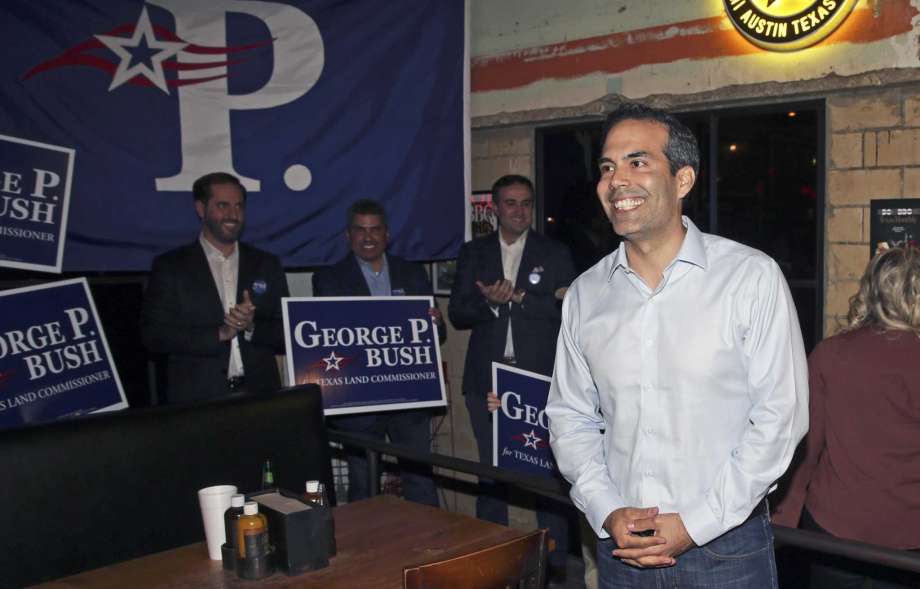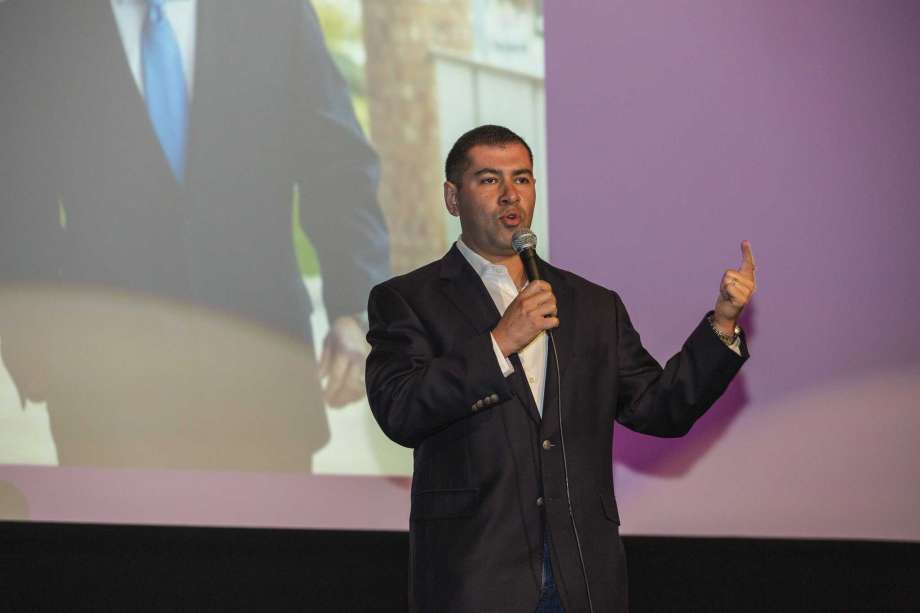- South and Midwest face potentially catastrophic rains and floods while reeling from tornadoes
- Deadly 2024 hurricanes prompt WMO to retire three names
- Body recovered in North Carolina identified as East TN man who has been missing ever since Hurricane Helene
- Report: Coastal flooding could threaten 1.4 million homes by midcentury
- Caught on camera | Tornado touches down in Missouri
Slow Hurricane Harvey response dogs Land Commissioner George P. Bush in re-election campaign

-
George P. Bush, commissioner of the General Land Office, arrives to discusses long-term Hurricane Harvey recovery funds during a news conference at the Houston City Hall Annex on Thursday, June 28, 2018, in Houston. The recovery efforts include the first round of funding for buyouts through CDBG-DR funds.( Brett Coomer / Houston Chronicle )
George P. Bush, commissioner of the General Land Office, arrives to discusses long-term Hurricane Harvey recovery funds during a news conference at the Houston City Hall Annex on Thursday, June 28, 2018, in
Photo: Brett Coomer, Staff / Houston Chronicle
George P. Bush, commissioner of the General Land Office, arrives to discusses long-term Hurricane Harvey recovery funds during a news conference at the Houston City Hall Annex on Thursday, June 28, 2018, in Houston. The recovery efforts include the first round of funding for buyouts through CDBG-DR funds.( Brett Coomer / Houston Chronicle )
George P. Bush, commissioner of the General Land Office, arrives to discusses long-term Hurricane Harvey recovery funds during a news conference at the Houston City Hall Annex on Thursday, June 28, 2018, in
Photo: Brett Coomer, Staff / Houston Chronicle
The Alamo and Hurricane Harvey relief are top issues as Land Commissioner George P. Bush’s seeks re-election, two topics that highlight difficulties of his first term. Nonetheless, Bush has name recognition and campaign funding that his Democratic and Libertarian opponents cannot match.
After a tough primary in which three Republicans challenged him, Bush is now up against two political newcomers in the general election — Democrat Miguel Suazo and Libertarian Matt Piña.
Suazo, an energy and natural resources attorney in Austin, said he was initially hesitant to challenge Bush, the scion of a Republican political dynasty in Texas that includes two former presidents and a former governor. But Suazo said he was persuaded by Democratic polls showing it is a winnable race. He is banking on a wave of Texans turning out to vote for U.S. Senate candidate Beto O’Rourke and picking him for land commissioner.
“For the first time in a long time, people have viable options in these races,” Suazo said of his own race and other statewide races such as the campaigns for attorney general and agriculture commissioner. “I will put my résumé next to Commissioner Bush’s any day of the week in terms of doing the work.”
Bush was easily elected in 2014 to the Texas General Land Office, a relatively obscure state agency that manages state lands, operates the Alamo, helps fund Texas public education through oil and gas leases, and helps the state recover from natural disasters.
After Hurricane Harvey swept through Texas in late August, Houston Mayor Sylvester Turner accused the General Land Office of “hogging” $5 billion in federal relief aid awarded in November. He criticized Bush for delays in making the funds available and said local government officials in Houston were largely excluded as Bush and his staff drafted a plan for how to use the money.
An analysis by the Houston Chronicle later that month found that the short-term housing effort led by Bush trailed well behind post-disaster efforts in other states and was hampered by interagency finger-pointing, legal wrangling and staffing shortfalls.
Shortly thereafter, Phil Wilson, general manager of the Lower Colorado River Authority, was tapped to join Bush’s office to speed up the process and get eligible storm survivors housing assistance through the Federal Emergency Management Agency.
“We can’t force people to use these programs,” Bush said in interviews early this year, in explaining the delays. “Constituents had ample opportunity to use these programs, and many chose to go a different path. And look, I get it. Your house is the most important investment that you make.”
Bush declined to comment for this article, directing reporters to his website and social media accounts.
At the same time that he was being criticized for his Harvey relief efforts, some state lawmakers were questioning Bush’s management of the Alamo.
In February, a draft audit that was leaked to the media noted troubles with the Alamo’s financial operations and criticized Bush for putting the Alamo under the management of three nonprofits that operate with less transparency than a government agency.
Bush later resigned from the board of the Alamo Trust, the nonprofit that oversees the Alamo’s daily operations, to avoid the appearance of a conflict of interest. The three nonprofits still operate fundraising and management of the Alamo.
After the final version of the audit was released at the end of May, the GLO’s chief financial officer was given oversight of the Alamo’s accounting office, and three employees with experience in finance were hired to oversee accounting and management.
Bush said implementing those changes resulted in the “highest level of oversight in the Alamo’s accounting and financial management.”
In a written response to questions about his priorities if re-elected, Bush names following through with the Alamo plan: “Restoring the Alamo to the place of reverence that it deserves to be by creating a world class museum telling the story of the battle, as well as taking back the original footprint back from the roads and carnival atmosphere that is currently at the site.”
He says Hurricane Harvey relief is another: “We are administering programs to help Texans get back on their feet and are continuing to work with Congress and the Trump administration to ensure continued aid to those affected by Harvey.”
The Alamo Master Plan, which had been in the works for four years, was approved by the San Antonio City Council earlier this month. The plan will lease the Alamo Plaza to the GLO and relocate the Cenotaph, a monument honoring Alamo defenders killed in the 1836 battle.
Despite the controversies in his first term, Bush still holds a strong advantage over his opponents in a state that hasn’t elected a Democrat to statewide office since 1994, said Brandon Rottinghaus, a political science professor at the University of Houston.
“Being a Bush presents credibility in certain circles, so that helps him to maintain a base of support that another Republican in this position might not have,” Rottinghaus said. “Incumbents are likely to get re-elected in almost any office, that’s a general trend. And if you’re a Republican in Texas and your name is Bush, the likelihood goes up significantly.”
Suazo said he believes his experience in energy law will mean he can effectively manage a major function of the office: to lease public lands to oil and gas companies. The revenue from those leases then goes into the Permanent School Fund, a main source of funding to public schools.
And he said he agrees with most of Bush’s Alamo plan, but wants to hire back the Daughters of the Republic of Texas to manage the shrine and keep the Cenotaph at its current location. He has also criticized Bush for not demanding that the governor call a special session following Hurricane Harvey so that the state could tap its rainy-day fund.
“I advocate for people, and I will do everything to represent their needs,” Suazo said.
Staff Writer Alejandra Matos contributed to this report.

